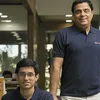Planning for the next four weeks, months, quarters, years: how we can survive and thrive in a world with coronavirus
In the recent DesignUp panel aptly titled ‘May The 4th Be With You,’ eight panelists shared advice on how to prepare for the era of the pandemic in the near, medium, and long term.
This past Monday on May 4, the team behind the DesignUp conferences hosted an online panel structured along the Star Wars movie series, titled ‘May The 4th Be With You.’ YourStory was the media partner for the event (see Part I and Part II of our panel previews).

Eight experts from disciplines including design were featured in a rapid round of lightning-sharp presentations (inspired by the light-sabre fights of the legendary movie series). They offered informative and provocative peeks into the “near future and futures far far away.”
See YourStory’s coverage of the annual DesignUp conference editions from 2019, 2018 and 2017, as well as our d-Zen (‘Design Zen’) section for more design resources. Also check out our three-part coverage of the earlier panel, ‘DesignUp Circuit: The pandemic’s impact on design as a business.’
Presentations and polls
To make the discussion focused and engaging, each of the eight speakers had to make a four-slide presentation on what they thought would be the key changes in the next four weeks, months, quarters and years. The speakers chose themes as varied as migrant worker lives, the impact of education, changes in the tourism industry, and the role of government.
The event also featured four online polls for audience participation, with multiple-choice answers. The questions were: when do you think we can get back to work in the office or studio without restrictions; when will we do a road trip with family or friends to the beaches or mountains without passes and permits; when can we hug or shake hands like courteous and loving humans; and when can we fly to another country without a worry.
The panel host was Shiva Viswanathan, Brand and UX Coach for Ogilvy PennyWise. He began by citing science fiction author Isaac Asimov: “It is change, continuing change, inevitable change that is the dominant factor in society today. No sensible decision can be made any longer without taking into account not only the world as it is, but the world as it will be.”
From vision to execution
The stage was appropriately set by the first speaker, Alysha Naples, Chief Experience Officer, Tin Drum (Amsterdam). She urged audiences to introspect deeply and map four activities on to the four periods: confront your mortality (in the first four weeks), clarify your values (in the first four months), build your dream (in the next four quarters), and live your vision (in the next four years).
She evocatively captured these phases in the form of four quotes:
“Far better it seems to me, in our vulnerability, is to look death in the eye and to be grateful every day for the brief but magnificent opportunity that life provides.” – Carl Sagan
“A man with outward courage dares to die; a man with inner courage dares to live.” – Lao Tzu, ‘Tao Te Ching’
“Love doesn’t just sit there, like a stone, it has to be made, like bread; remade all the time, made new.” – Ursula K. Le Guin, ‘The Left Hand of Darkness’
“As a day well spent brings happy sleep, so a life well spent brings happy death.” – Leonardo da Vinci

Sketchnotes by Rasagy Sharma
Learnings from ‘bad hair’ days
Himanshu Khanna, Founder of Sparklin (New Delhi), drew parallels with how people dealt with home issues ranging from their hair to household chores during the lockdown period. His sense of humour shone through in the choice of images for the slides – different kinds of haircuts.
“It's almost like the pandemic pushed us back to childhood. Whatever we didn't learn since then, we are forced to learn now,” he joked. Drawing on the yuga framework, he mapped activities onto the four phases of mimicry (like a new-born), self-discovery (curiosity and experimentation), commitment (solution and breakthrough), and legacy (harmonious dialogue, enlightenment).
“There are parallels between our acceptance and learnings through the current situation with the four stages of life. In some weird moment, it sounded very similar to how the yugas move in a cycle from Kali to Satya,” he explained.
“Though we are struggling in the initial phase – looking at each other to mimic and learn, by the end, we will get comfortable. Humans always do. That's how we survive and have survived in the past,” Himanshu explained.
“The inner spirit is bigger than our outer aspirations. We all will eventually reach that golden stage of acceptance and comfort,” he summed up. Himanshu later shared with YourStory that he is also donating earnings from his consultations to relief funds; donors get preferential slots as well. His efforts have also been covered in ‘Outlook’ magazine.
Impact on migrant workers
The plight of India’s migrant workers was highlighted in photographic storytelling form by Shaheena Attarwala, Design Director at Zoomcar (Bengaluru). “The migrant worker crisis in times of pandemic is far from over – 40 million internal migrant workers across India now want to go back home to their families,” she explained.
She narrated the issue in four phases: current hardship, the journey back home, eventual return to the city, and long-term aspirations and rights. “While the middle class has the privilege of practising social distancing in the comfort of their homes, these labourers are living in inhuman conditions, and desperation has made them take the unimaginable step of walking hundreds of kilometres back to their homes,” she lamented.
The situation gets even more complex for women and child labourers. “Some have died on the journey to their home. Furthermore, communal and gender-based violence is on the rise,” Shaheena added.
“It is a great disadvantage today to belong to a minority religious group. They fear making the long walk back home due to the risk of being lynched or being put in a vulnerable spot,” she cautioned.
She criticised the current situation of state apathy and arbitrary execution of orders by governments. “Efforts should be made to let migrants go back home when they wish. It’s human nature for us to be with our families in times of crisis, and they want just that,” Shaheena urged.
Unfortunately, migrant labourers in India are historically treated as second-class or invisible citizens, and this pandemic has reaffirmed that societal bias. “They are beaten at borders, die walking home, or die of hunger staying back in the city living an undignified life,” Shaheena lamented.
“Labourers flock to the city to earn a dignified life not to live at the mercy of the middle class. Questioning why they want to go back or holding them back against their will in the city is plain selfish use of muscle power against the already-marginalised section of the society,” she emphasised. Instead of travel surcharges, donations made by Indian citizens must be used for this purpose, she advocated.
In the near future, the state must bring in policy reforms as a safety net for the labour force. As examples, Shaheena listed Universal Basic Income, insurance, health services, cash transfer, labour rights, and protection from discrimination. “Safety will be one of the most important deciding factors in integrating women and minority labour forces back into urban society,” she added.
Over the next couple of years, the labour force in India would want to come back with hope, she summed up. “But the employment rate is currently at its worst, and stimulus packages will be needed urgently otherwise there will be more civil unrest in society,” Shaheena cautioned.
She later explained to YourStory that she has helped raise relief funds through an online campaign on Ketto; over Rs 23 lakh have been raised so far. Migrant labourers, daily wagers, pregnant women and children in the slums of Mumbai are being assisted through supplies of cooked meals, food, essential items, and medical camps for issuing medical certificates.
Financial inclusion
Dharmesh Ba, Head of Research, Setu/D91 Labs, shed light on the need for more financial inclusion. “The current health crisis provides an opportunity to accelerate technology adoption in distributing financial products, thereby bringing us closer to the reality of financial inclusion,” he explained.
He divided this financial journey into four steps: bill payments (first four weeks), insurance (four months), savings (four quarters), and digital credit (four years). “These activities create a digital trail for formal financial institutions to evaluate intent and ability to repay loans,” he said.
“High smartphone penetration gave us the accessibility to technology, but the current health crisis gives us a reason to put technology to its utmost use. In other words, India will soon move beyond just creating TikTok videos to comment on the crisis,” he summed up.
Dharmesh later shared with YourStory that he has been approached for job opportunities by those who have been laid off. He and his Twitter friends have launched an initiative called ‘Jobs and Hopes’ in this regard, to collect such information and share it with HR heads.
The journey of the travel industry
Fatema Raja, UX Lead at Gojek (Bengaluru) explained how the travel and tourism sector has been hit hard by the pandemic, and what a recovery may look like. “Much of the world is in lockdown, many people are unable or unwilling to travel. The only thing that seems to be getting through all the closed borders and travel bans is the virus itself,” she lamented.
“When the much-awaited regular travel returns, it’s likely to come back in stages. The face of travel will change, how people choose their destinations will change,” she emphasised.
For example, in the near term (four weeks), most travel will be largely for essential-only purposes. The travel urge will be met via online experiences and TV shows. “Viewing nature digitally also has been scientifically proven to help peoples’ mental wellbeing, which feels especially important right now,” Fatema explained.
Once air travel starts picking up (say within four months), the spike will be travellers trapped in different countries and wanting to return home. “After that, air travel will fall off the cliff. Instead, day trips, camping and visits to small parks will be the trend,” she predicted.
With these baby steps, people try to rebuild their confidence for venturing beyond home. “I anticipate road trips to soar in popularity when travel resumes. Which means that some people who never thought of cars as a wise asset investment will rethink their decisions,” Fatema observed.
People’s fundamental definition of assets will change. “There will be an uptake in two-wheelers and four-wheelers for private transportation,” Fatema predicted.
“Even in the next one year, international travel will most likely not come back to status quo. Locked borders will also impede such travel. Instead, domestic travel will be the first type of trip people will take, and untapped domestic destinations will be a huge trend,” she said.
“Nature will be a big attraction given how much time we’ve spent at home. Tourists will pick sparsely-populated areas and not major cities,” Fatema said. This could be the time for a major shift in people’s perspective towards travel.
“Travel will be more meaningful and planned. The hospitality industry will have to match high service standards, and make luxury slightly more affordable,” she advised.

Business travel will take a dip. “This crisis has given a good crash course in remote working and gave birth to amazing remote collaboration tools,” Fatema observed. The future of travel will not only depend on the travel discounts or vaccines becoming available, but also on how well the travel industry can convince us that we’re safe in their hands, she added.
Interestingly, tourism will explode only later, over the next four years. “People who have saved up will want to travel to as many places as they can. It will be 2019 on steroids, but the way people would be choosing places to travel will see a major shift,” Fatema predicted.
“Travelling to obscure places will be on the rise. Governments will have to rethink their tourism policies in order to reinforce travel, especially for countries that are dependent on tourism for their economy,” she recommended.
On the commute side of travel, Fatema said aircrafts will have to be re-designed to maintain social distancing and high sanitisation. “I see sanitisation tunnels at the airports right before check-in, vaccine stamps will become a mandate, and passengers will choose travel insurance plans with care,” she added.
In sum, travel will become more expensive and take longer to plan. “Safety and affordability will be key components in ensuring how and when people will travel again. But the truth is, we will always want a vacation and we will always want to travel. It’s just going to take us a little while to find our footing and soothe our anxiety once we are given the green light,” Fatema concluded.
She later explained to YourStory some of Gojek’s COVID-specific initiatives, such as donations to the Anak Bangsa Bisa Foundation, collaboration with rock band Slank to raise funds, an online fundraising hackathon in Jakarta, and cooked meals delivered to hospitals and quarantine centres.
Education for the poor
Nikita Sarkar, UX Researcher, Google (Gurgaon) delivered a powerful presentation on the plight of migrant labourers’ children. “Due to the nature of their lifestyle, migrant children don't develop cognitive skills as per age requirement in basic areas like reading and writing. The COVID-19 crisis will dry up labourers’ earnings, which will lead to children being nudged into child labour just to support the family,” she lamented.
“We should start thinking of how we can help them in their learning journey,” Nikita urged, conveying her message in story form about a child called Nabil. Based on her field research, she explained the challenges migrant workers have faced in finding schools for their children.
Fortunately, some NGOs run schools that offer education and safety. Some children also use their parents’ phones to access YouTube cartoons and create TikTok videos. In their own unsupervised way, they develop some learning capabilities and skills.
It would be great for schools to add online learning as an offering, in this regard. Unfortunately, many of these schools that run on donations will face a funding crunch. But even if the school funding situation improves, many labourers may still want their children to work instead of attending school. It may take a longer while for Nabil to give exams, and maybe even longer to fulfil his dream of becoming an animal doctor, Nikita explained.
She cited UNESCO data which shows that the number of migrant children in 2013 was estimated to be 15 million. “Research is predicting that things won’t go back to normal like before, after this pandemic,” Nikita cautions.
The crisis is accelerating the move to digital learning. “Can we imagine a future for these migrant children where they don’t have to physically be present in school to be called educated?” Nikita signed off.
Politics and government
Parallels to science fiction and earlier classic treatises on government were the focus of the presentation by Anshuman Bapna, Founder, Terra.do, and former CPO, MakeMyTrip (Bengaluru).
In sci-fi movie Solaris, the villain is the sun around which the space station revolves. “That sun amplifies the deepest, most desperate desires of anyone who looks into it,” he explained. “COVID-19 feels like Solaris. It takes our deepest hopes and most morbid fears and projects them into the world,” he added.
The next four weeks will pose a tough choice for governments to make as they balance the decision of saving lives versus saving livelihoods. Anshuman drew on the metaphor of the Trolley Problem to explain this dilemma. “As the mounting cost to the economy becomes clear, governments across the world will need to weigh the cost of a human life as they open up,” he said.
“A push to open up the economy faster at the expense of lives will eventually circle back to have a tragic effect on the economy. And vice versa. Truly a Hobbesian choice,” Anshuman said.
He then likened economic predictions for the next four months to the ‘dead cat bounce’ (small recovery). “Both supply and demand have fallen off a cliff across much of the world. At the same time, we haven’t seen such a massive imposition on people’s liberties across the globe before either,” he observed.
There could be a temporary rebound in stock markets, and even a spike in ‘debauchery’ in the form of long queues outside liquor shops. Anshuman also cautioned that there could be a second wave of COVID-19 in winter.
In the next year, existing and exposed fault-lines will crack open. “This pandemic has laid bare all the fault-lines in our unequal world – our income inequalities, our pillaging of this planet and our unsustainable lives,” he observed.
“We will see explosions of social unrest across the world – from the banlieues (suburbs) of Paris to the migrant workers of Surat. This will then become the perfect pretext for the Panic of the Elites,” Anshuman predicted. They will support drone policing and ghettoisation that would keep the “masses in their place”.
“You don’t need to look too far – check your own apartment complex to see the kind of rules that will apply to house help who come from outside your boundaries,” he explained.

In the long run, more people will realise that our fates across the planet are inextricably connected. “People will surprise the Elites by organising into emergent groups. Crowdsourcing will be used to find answers traditionally addressed by government,” Anshuman predicted.
People will share lessons, products, and tribal wisdom seamlessly, as seen in the emergence of sites like CovidIndiaTaskforce, StartupsVsCovid, Coronathon.in, HelpWithCovid, and EndCoronavirus.
“These sites sprang up overnight with thousands of exceptional volunteers. We’ll see these work communities spring up to solve our hardest problems,” Anshuman explained. He himself has launched Terra.do in this regard, an online school for solving climate change.
He concluded with the analogy of Hobbes’ Leviathan, written 400 years ago. It speaks of the role of strong, undivided government to use their massive capacity in tackling major problems. “Over the next few years, we’ll begin to appreciate how important, and how powerful an activist state can be,” Anshuman predicted.
But a strong state could go either way, he cautioned. “There’s a fork in the road ahead of us. One path can lead to isolationist states that erode the civil liberties of their citizens in the name of security. The other path has states expanding their roles to provide free universal healthcare and even Universal Basic Income,” he explained.
“Both type of states will prioritise a revival of the economy. But only one will use this crisis as an opportunity to rebuild in a way that’s inclusive and resilient,” he predicted.
After all, the US invented social security after The Great Depression. “2030 will feel like what 1950 must have felt like in the US – a future of endless possibilities. And our children will look back at 2020 as the year when it all changed,” he said poetically.
Looking ahead, Anshuman warned that the “mother-of-all-COVIDs” is hurtling towards us — climate change. “We will realise that COVID was the bullet, but Climate was the trigger,” he summed up.
“Strong national governments combined with collective action from their populations will ultimately win the day. Our COVID response will show that bold action is not only possible, it is a politically winning strategy. This new-found self-belief will revive the national projects of many countries, and that elusive political will for fixing the planet will finally arrive,” said Anshuman.
WFH: impact on skilling
The next speaker brought things back to daily working life by addressing how working from home (WFH) will impact hiring. Yonatan Levy, VP Product at THE FLOOR, explained that people must use this opportunity to build their online personal brands.
“Remote hiring requires new skills from candidates. Structured video recordings can replace our CVs and most of our suitability assessment would be done asynchronously when we are not online,” he said.
He recommended the following activities mapped onto time phases: screen tests for online lighting, background and posture (four weeks), online content in the form of blogs, podcasts, newsletters and social media posts (four months), authority and influence in your specialty (four quarters), and recorded interviews for asynchronous hiring (four years).
Yonathan also cautioned that one of the consequences of too much online WFH is ‘Zoom exhaustion.’ This ‘Zoom fatigue’ is a result of too much straining to gain non-verbal cues in communication from small online windows for each speaker.
Transformations: The Road Ahead

Madanmohan Rao, Research Director at YourStory, summed up the hour-long discussion by drawing connections between the various presentations and adding new trajectories (see summary in the table above). Four key emotions to strengthen in the coming years include gratitude (for all that we have but take for granted), empathy (with those going through struggles that we may not be aware of), dignity (for labourers), and a sense of humour to ride the rough times.
Four key activities at a personal and professional level will be journaling (diaries to capture daily stories for analysis and fun), introspection (revisiting purpose, vision, ambition), experimentation (to learn during conditions of uncertainty), and collaboration (across sectors, eg. with government).
Each organisation and sector will need to strengthen and modify itself in future. Key sectors going ahead will be design, eg. configuring for the needs of safe distancing in public spaces, retail outlets, planes, and experiences during shopping and concerts.
The health sector will come to the forefront for tracking, tracing and treating patients, and building public immunity through vaccination. Just as some African countries require visitors to have yellow fever vaccination booklets, so also we may all need to travel with COVID-19 vaccination certificates.
The sectors dealing with finance and the economy will play a major role in providing support in the form of loans and credits. Many countries have social security programmes for the unemployed. Others like India will have to seriously consider Universal Basic Income provisions for labourers.
The education sector (in the broadest sense of the word, spanning schools, colleges, corporate training, skilling) will go through a rapid change due to digital transformation. It will play a key role in upgrading workforces to deal with the ‘new normal,’ and sustainable responses for tackling the larger challenge of climate change.
Finally, though plans may change often, it is important to develop plans for the next weeks, months, quarters and years. However, changes can also be immediate and drastic, eg. a sudden death in the family, which will be even more hard to bear due to the requirements of community isolation during lockdown.
In the long run, societies will need to ‘memorialise’ and ‘institutionalise’ learnings from the pandemic. This includes narratives like exhibitions, museums, plays and movies. While most movies on these themes are produced by Hollywood, other hubs like Bollywood may produce movies featuring the next Irrfan Khan as a doctor or migrant worker during coronavirus.
Building on the Star Wars structure of this DesignUp panel, we may say that we are in Episode IV (A New Hope). The lockdown is seen as a sign of a hope for flattening the curve, and to buy time for strengthening the healthcare system.
Episode V will truly be The Empire Strikes Back, as we emerge from lockdown and face the full brunt of the virus along with our own human viruses of fear and hate. Companies will struggle with economic hardships, and countries will play the blame game about who started the virus and who should pay compensation.
Episode VI, in that sense, will be not ‘The Return of the Jedi’ but ‘The Reinvention of the Jedi’ as we all reinvent ourselves and take our newfound strengths to new heights and frontiers. Reinvention will be at the level of individual, family, neighbourhood, community, province, nation, and indeed all of humanity.
Next steps
The DesignUp community has a series of online events planned for the course of the year. “The recordings, slides, posts and other material from the May the Fourth event are all available online,” said Jay Dutta, SVP UX Design at MakeMyTrip, and Founder-Curator, DesignUp Festival, in a chat after the event with YourStory.
“Zoom tells us the highest attendee count at one point was 333, the average viewer count was 259. Twitter was abuzz, with three long threads and multiple offshoots,” he added. More resources and announcements are accessible via Twitter, LinkedIn, and Instagram.
Many online attendees shared insights in the online chat window as well. “Films in future might even start to portray 'normalcy' as reality becomes fiction,” joked Maanasi Shankar.
“I think there is one thing that a lot of us are not talking about, and that is the mental health of people during these times. We need to make sure we are all taking help and doing well,” urged Sneha Vachhaney.
It would be fitting to end this write-up with one more quote which Alysha Naples added to the discussion, by Kurt Vonnegut: “The most daring thing is to create stable communities in which the terrible disease of loneliness can be cured.”
Edited by Teja Lele












